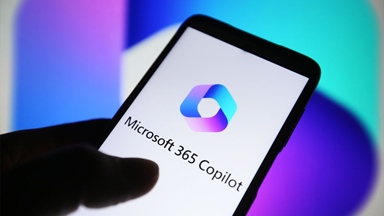Loading component...
At a glance
By Adam Turner
While Hollywood paints the future of AI as the story of self-aware machines revolting against humanity, in the real world, AI isn’t out to overthrow us.
Instead, the role of AI in the workplace is to work alongside people to boost their efficiency and productivity.
The rise of ChatGPT brought generative AI to mainstream attention, with its ability to understand questions posed in natural language and craft in-depth answers that read as if they were written by a person.
ChatGPT’s insights come from scouring the entire internet, which sometimes creates problems when it comes to accuracy and bias.
How Copilot works in business
To safely bring generative AI into the workplace, Microsoft’s Copilot is embedded with the Microsoft 365 suite, which includes applications such as Word, Excel and Outlook.
Google has similar ambitions for its Bard chat-based AI tool, which is currently in beta, and Apple is also reportedly working on its own AI tools.
Rather than draw upon the supposed wisdom of the internet, Copilot is trained on limited datasets and draws insights from a business’s own data stored in Microsoft’s cloud. Copilot can also act as a subject-matter expert if trained on a subset of trusted data. It can cite its sources, allowing its accuracy to be checked.
Copilot was made available to Microsoft 365 enterprise customers in November 2023. Copilot inherits Microsoft 365 data residency commitments.
How Copilot works with data
While AI has the power to extract deeper insight from financial data, Copilot’s abilities go far beyond crunching numbers. Its strength is in analysing vast amounts of unstructured data within Microsoft 365 – such as email archives, meeting notes, business reports, spreadsheets, presentations and other documentation in SharePoint – and using this wealth of knowledge to generate new content.
Along with helping finance professionals, small businesses and startups improve their understanding of a topic, Copilot can also help them communicate insights more effectively.
It can write executive summaries, craft simple definitions to explain complicated concepts and look for different insights of interest to different stakeholders.
Within Outlook, Copilot can prioritise important emails and summarise long threads. More impressively, it can draft replies.
For example, it can draft a reply to a query about sales trends by studying recent sales data. The user can then edit the draft, with the ability to change the length, level of detail and writing style before pressing send.

Acting like a smart research assistant, Copilot will be a significant time saver for finance professionals, says Fahim Khondaker, partner and leader of BDO’s data analytics and insights team.
“Very soon, I don’t think we’ll be writing first draft emails or other documents anymore,” Khondaker says, who is also professor of practice at the University of New South Wales.
“Copilot can deal with a lot of transactional emails, such as updating someone on a project or arranging a meeting, while still leaving the person in full control of what’s actually sent.”
“That might sound a little impersonal, but it will actually leave people with more time to spend on meaningful human interactions and higher value tasks.”
How Copilot saves you time
The benefits of Copilot extend to Word. For instance, it can analyse and summarise large bodies of information, and draft content such as business reports and blog posts.
Support for natural language queries allows users to simply state what they wish to know, rather than having to rely on the complex syntax of a structured programming language. This makes generative AI a powerful tool for researching topics, exploring ideas and brainstorming, Khondaker says.
According to research from MIT, taking advantage of generative AI to assist with such writing tasks can decrease the time it takes to complete the task by 40 per cent and increase output quality by 20 per cent.
“Businesses have a treasure trove of internal knowledge spread far and wide,” Khondaker says.
“Copilot puts it all at your fingertips, so you can easily make the most of it every day, and it’s built right into the productivity tools that most businesses are already using.”
How Copilot helps with research

Along with drafting content, Copilot can also help accountants recap interactions with people in preparation for meetings, once again delivering time savings while improving outcomes, says KPMG chief digital officer John Munnelly.
“By drawing on the data within Microsoft 365, you can ask Copilot to summarise your recent conversations with the CFO before an important meeting,” Munnelly says.
“This might include studying emails, Teams messages, meeting notes and other unstructured data that is spread throughout Microsoft 365.
“This way, Copilot can save you a lot of time and effort – while doing a more thorough job – to ensure you go into that meeting better prepared and hit the ground running rather than needing to recap.”
As an early access partner for Microsoft 365 Copilot, KPMG was one of the first organisations in Australia to get hands-on with the technology. From the early benefits, Munnelly believes it will become a “must-have for everybody working in professional services”.
“I think Microsoft really nailed the terminology with the name ‘Copilot’, because it’s like someone sitting next to you, rather than taking over from you,” he says.
“It’s not making the decisions for you, but it’s helping you make better decisions more quickly.”
“Ultimately, a human still needs to make the decision. As the saying goes, this technology won’t replace people, but people who use this technology will replace people who don’t.”
How Copilot ensures accountability
Copilot’s intuitive support for natural language queries ensures that the learning curve isn’t too steep for employees. The challenge for most organisations will be implementing the right checks and balances to ensure generative AI is used responsibly.
As part of this, KPMG has implemented its own “trusted AI” framework, based around eight core principles – focusing on fairness, explainability, accountability, security, privacy, safety, data integrity and reliability.
Any business needs to ensure there is transparency and human accountability around how generative AI is used, and the decisions made based on its insights, Munnelly says.
After undertaking proof of concepts to understand how they can benefit from the technology, it is essential for businesses to establish a responsible AI framework before they put it into production environments.
“In time, a responsible AI framework is going to be like a modern slavery policy, something that every business must have in place and be able to demonstrate compliance,” he says.
“Your suppliers, customers and partners will demand that a responsible AI framework be in place before they do business with you.”
“At the end of the day, it is not acceptable for a person or a business to shirk their responsibility and place the blame for a bad or biased decision on AI – there has to be accountability if there is going to be trust.”
Upskill yourself: Master work productivity with AI (online course)

